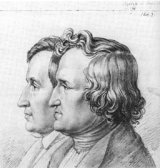Iron Hans Page #2
"Iron Hans" is a fascinating fairy tale by The Brothers Grimm that follows the story of a young boy who accidentally released Iron Hans, a wild man, from his cage. Iron Hans then requests the boy as a companion and promises the boy's father that he will return unharmed. The story takes exciting twists and turns as the boy gets various life lessons from Iron Hans and eventually becomes a king. Meanwhile, Iron Hans is released from a curse and turns out to be a powerful king as well. The tale is often interpreted as a coming-of-age story that signifies a boy's transition to adulthood.
would take him in. The people about court did not at all know what use they could make of him, but they liked him, and told him to stay. At length the cook took him into his service, and said he might carry wood and water, and rake the cinders together. Once when it so happened that no one else was at hand, the cook ordered him to carry the food to the royal table, but as he did not like to let his golden hair be seen, he kept his little cap on. Such a thing as that had never yet come under the king’s notice, and he said: ‘When you come to the royal table you must take your hat off.’ He answered: ‘Ah, Lord, I cannot; I have a bad sore place on my head.’ Then the king had the cook called before him and scolded him, and asked how he could take such a boy as that into his service; and that he was to send him away at once. The cook, however, had pity on him, and exchanged him for the gardener’s boy. And now the boy had to plant and water the garden, hoe and dig, and bear the wind and bad weather. Once in summer when he was working alone in the garden, the day was so warm he took his little cap off that the air might cool him. As the sun shone on his hair it glittered and flashed so that the rays fell into the bedroom of the king’s daughter, and up she sprang to see what that could be. Then she saw the boy, and cried to him: ‘Boy, bring me a wreath of flowers.’ He put his cap on with all haste, and gathered wild field-flowers and bound them together. When he was ascending the stairs with them, the gardener met him, and said: ‘How can you take the king’s daughter a garland of such common flowers? Go quickly, and get another, and seek out the prettiest and rarest.’ ‘Oh, no,’ replied the boy, ‘the wild ones have more scent, and will please her better.’ When he got into the room, the king’s daughter said: ‘Take your cap off, it is not seemly to keep it on in my presence.’ He again said: ‘I may not, I have a sore head.’ She, however, caught at his cap and pulled it off, and then his golden hair rolled down on his shoulders, and it was splendid to behold. He wanted to run out, but she held him by the arm, and gave him a handful of ducats. With these he departed, but he cared nothing for the gold pieces. He took them to the gardener, and said: ‘I present them to your children, they can play with them.’ The following day the king’s daughter again called to him that he was to bring her a wreath of field-flowers, and then he went in with it, she instantly snatched at his cap, and wanted to take it away from him, but he held it fast with both hands. She again gave him a handful of ducats, but he would not keep them, and gave them to the gardener for playthings for his children. On the third day things went just the same; she could not get his cap away from him, and he would not have her money. Not long afterwards, the country was overrun by war. The king gathered together his people, and did not know whether or not he could offer any opposition to the enemy, who was superior in strength and had a mighty army. Then said the gardener’s boy: ‘I am grown up, and will go to the wars also, only give me a horse.’ The others laughed, and said: ‘Seek one for yourself when we are gone, we will leave one behind us in the stable for you.’ When they had gone forth, he went into the stable, and led the horse out; it was lame of one foot, and limped hobblety jib, hobblety jib; nevertheless he mounted it, and rode away to the dark forest. When he came to the outskirts, he called ‘Iron Hans’ three times so loudly that it echoed through the trees. Thereupon the wild man appeared immediately, and said: ‘What do you desire?’ ‘I want a strong steed, for I am going to the wars.’ ‘That you shall have, and still more than you ask for.’ Then the wild man went back into the forest, and it was not long before a stable-boy came out of it, who led a horse that snorted with its nostrils, and could hardly be restrained, and behind them followed a great troop of warriors entirely equipped in iron, and their swords flashed in the sun. The youth made over his three-legged horse to the stable-boy, mounted the other, and rode at the head of the soldiers. When he got near the battlefield a great part of the king’s men had already fallen, and little was wanting to make the rest give way. Then the youth galloped thither with his iron soldiers, broke like a hurricane over the enemy, and beat down all who opposed him. They began to flee, but the youth pursued, and never stopped, until there was not a single man left. Instead of returning to the king, however, he conducted his troop by byways back to the forest, and called forth Iron Hans. ‘What do you desire?’ asked the wild man. ‘Take back your horse and your troops, and give me my three-legged horse again.’ All that he asked was done, and soon he was riding on his three-legged horse. When the king returned to his palace, his daughter went to meet him, and wished him joy of his victory. ‘I am not the one who carried away the victory,’ said he, ‘but a strange knight who came to my assistance with his soldiers.’ The daughter wanted to hear who the strange knight was, but the king did not know, and said: ‘He followed the enemy, and I did not see him again.’ She inquired of the gardener where his boy was, but he smiled, and said: ‘He has just come home on his three-legged horse, and the others have been mocking him, and crying: “Here comes our hobblety jib back again!” They asked, too: “Under what hedge have you been lying sleeping all the time?” So he said: “I did the best of all, and it would have gone badly without me.” And then he was still more ridiculed.’ The king said to his daughter: ‘I will proclaim a great feast that shall last for three days, and you shall throw a golden apple. Perhaps the unknown man will show himself.’ When the feast was announced, the youth went out to the forest, and called Iron Hans. ‘What do you desire?’ asked he. ‘That I may catch the king’s daughter’s golden apple.’ ‘It is as safe as if you had it already,’ said Iron Hans. ‘You shall likewise have a suit of red armour for the occasion, and ride on a spirited chestnut-horse.’ When the day came, the youth galloped to the spot, took his place amongst the knights, and was recognized by no one. The king’s daughter came forward, and threw a golden apple to the knights, but none of them caught it but he, only as soon as he had it he galloped away. On the second day Iron Hans equipped him as a white knight, and gave him a white horse. Again he was the only one who caught the apple, and he did not linger an instant, but galloped off with it. The king grew angry, and said: ‘That is not allowed; he must appear before me and tell his name.’ He gave the order that if the knight who caught the apple, should go away again they should pursue him, and if he would not come back willingly, they were to cut him down and stab him. On the third day, he received from Iron Hans a suit of black armour and
Translation
Translate and read this book in other languages:
Select another language:
- - Select -
- 简体中文 (Chinese - Simplified)
- 繁體中文 (Chinese - Traditional)
- Español (Spanish)
- Esperanto (Esperanto)
- 日本語 (Japanese)
- Português (Portuguese)
- Deutsch (German)
- العربية (Arabic)
- Français (French)
- Русский (Russian)
- ಕನ್ನಡ (Kannada)
- 한국어 (Korean)
- עברית (Hebrew)
- Gaeilge (Irish)
- Українська (Ukrainian)
- اردو (Urdu)
- Magyar (Hungarian)
- मानक हिन्दी (Hindi)
- Indonesia (Indonesian)
- Italiano (Italian)
- தமிழ் (Tamil)
- Türkçe (Turkish)
- తెలుగు (Telugu)
- ภาษาไทย (Thai)
- Tiếng Việt (Vietnamese)
- Čeština (Czech)
- Polski (Polish)
- Bahasa Indonesia (Indonesian)
- Românește (Romanian)
- Nederlands (Dutch)
- Ελληνικά (Greek)
- Latinum (Latin)
- Svenska (Swedish)
- Dansk (Danish)
- Suomi (Finnish)
- فارسی (Persian)
- ייִדיש (Yiddish)
- հայերեն (Armenian)
- Norsk (Norwegian)
- English (English)
Citation
Use the citation below to add this book to your bibliography:
Style:MLAChicagoAPA
"Iron Hans Books." Literature.com. STANDS4 LLC, 2025. Web. 22 Jan. 2025. <https://www.literature.com/book/iron_hans_2127>.




Discuss this Iron Hans book with the community:
Report Comment
We're doing our best to make sure our content is useful, accurate and safe.
If by any chance you spot an inappropriate comment while navigating through our website please use this form to let us know, and we'll take care of it shortly.
Attachment
You need to be logged in to favorite.
Log In